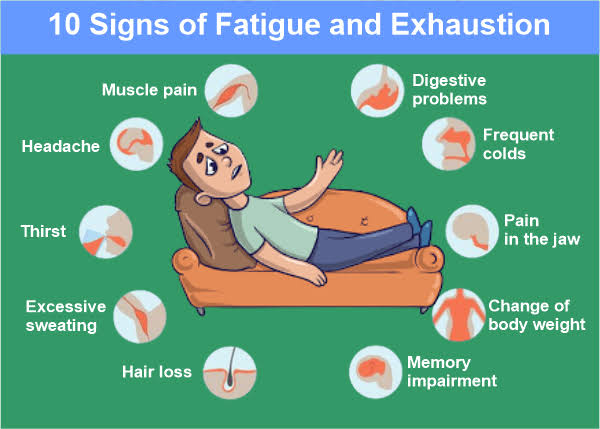Is fatigue a disease in itself? Fatigue can be described as a lack of body energy and mental and physical stimulation, and it is worth mentioning that fatigue is a symptom and not a disease in itself, that is, it is a symptom of many diseases, but it differs from chronic fatigue syndrome, and according to the Center for Disease Control and Prevention (CDC), “Chronic fatigue syndrome is a complex and serious disease in most cases, and is characterized by specific criteria.”
Fatigue can cause a wide range of physical, mental, and emotional symptoms. It may be accompanied by lack of concentration, muscle pain, and other symptoms and signs that may include all organs of the body, including the following symptoms: feeling chronic fatigue or drowsiness. Headache. Dizziness. Muscle weakness. Slow reactions and response. Poor decision-making ability. Mood swings, such as irritability. Poor eye-hand coordination. Anorexia. Decreased vital immune system functions. Blurred vision. Short-term memory problems. Hallucinations. Lack of attention to the situation to which the person is exposed. Lack of motivation. Fatigue is caused by a wide range of diseases. It is not a disease alone, and its symptoms can include all physical, emotional and mental functions and cycles of the body. When should you see your doctor? If a person suffering from fatigue tries home remedies to get rid of the most common lifestyle-related causes, such as lack of sleep and rest, poor diet habits, and stress, but does not find an improvement in symptoms, or if fatigue persists for two weeks or more, then he or she should visit a doctor. In addition to the following matters:
In case the person cannot think properly about anything. In case the body temperature rises above normal values and rates. The patient feels very sensitive to cold temperature or cold weather. Difficulty falling asleep or staying asleep. In case he thinks he is depressed. It is important not to be negligent in the matter, especially when symptoms of fatigue persist for more than two weeks. You must visit a doctor at that time, to give appropriate solutions after diagnosing and evaluating the condition. When should you visit the emergency room? Symptoms may worsen in some cases, and fatigue may be the result of a serious medical condition, and therefore the patient will need additional and emergency health care. The person must go to the emergency room immediately if fatigue is accompanied by one of the following symptoms:
Occurrence of bloody bleeding from the rectum. Vomiting blood. strong headache. Feeling very weak. Heart rhythm disorders. shortness of breath. Severe and sharp pain in the abdominal area. Thinking about suicide or harming others. Severe back pain. Fatigue may cause serious symptoms that cannot be tolerated, and it may be caused by serious medical conditions, then you must go to the hospital as soon as the previous symptoms appear, to take appropriate remedial measures.

